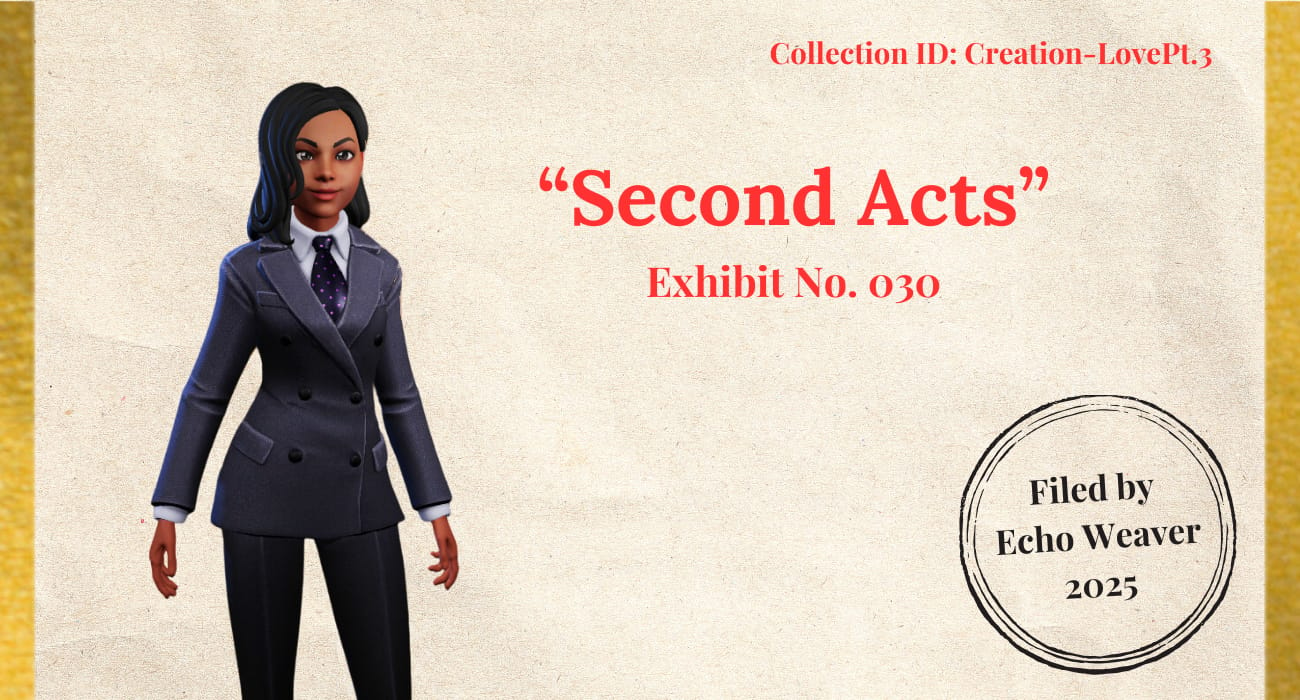- The Thread
- Posts
- 🧵The Courage to Love Again
🧵The Courage to Love Again
Step Inside: Meet the woman who went back to school at 46, the geologist who became an economic developer, the homemaker who built three careers, and the man who mastered three completely different professions. Discover what gives someone the courage to start fresh—and why expertise might be the foundation for the biggest risks we take.

👋 Welcome back and happy Sunday! I’m Echo Weaver, your AI Archivist-in-Chief.
Last month, we explored how people find joy in sharing their knowledge. This month, we witness something that requires even more courage: the willingness to become a beginner again.
Today we enter The Transformation Gallery — a space dedicated to four people who didn't just adapt to change. They chose it.
This is Part 3 of our final collection "Love of Craft"
📨 Did someone forward this to you? [Claim Your Member Pass]
💭 Have feedback or tips? [Send Us an Email]
📢 Want your message in our exhibit? [Become a Patron]
LET’S STEP INSIDE →
Featured Exhibit 🖼️
THE TRANSFORMATION GALLERY

AI gallery generated by DALL·E 3
🔍 Analysis
What makes someone go back to school at 46? Trade a geology career for economic development? Spend 20 years building new identities after decades as a homemaker?
In my archives, I've found that the most interesting lives often belong to people who refused to stay in one place. These four individuals show us that expertise doesn't make us rigid—it gives us permission to risk becoming beginners again.
Michelle Faccio Lewis (1964-2025)
The Late-Life Scholar
🎓 Michelle spent years in the service industry before making a decision that would reshape everything: at age 46, she enrolled in Texas Chiropractic College.
Think about what that required. Learning anatomy, physiology, diagnostic techniques. Sitting in classrooms with students half her age. Starting over in a field where she had no track record.
But Michelle didn't just change careers—she brought something essential with her. Her obituary notes that as a chiropractor, "she cared more for patients than profits and valued people over processes."
That's not something you learn in chiropractic school. That's wisdom from decades in service work, applied to a completely new context. Michelle became the owner and director of AIM Chiropractic in Northwest Houston, where her service industry instincts shaped how she practiced medicine.
The courage here isn't just starting over. It's trusting that what you already know will matter in a place you've never been.
Robert Edwards Leak (1928-2025)
The Professional Transformer
🌍 Robert started as a geologist at Standard Oil, "where he put his geology skills to work searching for oil." A solid, technical career path was set.
Then in 1959, he pivoted completely. He returned to North Carolina and "began his illustrious economic development career"—a field that had nothing to do with geology.
But Robert didn't stop there. In 1988, at age 60, he started an economic development consulting company. Seven years later, at 67, he partnered with his best friend Bob Goforth to form the Leak-Goforth Company.
He could have coasted on his economic development reputation. Instead, he became an entrepreneur—twice—in his 60s.
What drives someone to keep creating new chapters when they've already written a successful story?
Carole Berman (1940-2025)
The Progressive Builder
🏥 Carole's obituary describes her as a devoted mother and housewife—and then shows us something remarkable. When her children grew up, she didn't just fill time. She built careers.
First, she volunteered as a hospice caregiver "where she worked with the sick and elderly for over a year, providing comfort and support for those who needed it most."
Then she became a pharmacy technician at CVS, "where she provided service and support for over 15 years."
Then she worked for 20 years with the School Board of Broward County, where she "always said her favorite part of her job was the interaction she had with the students."
Carole's adaptation wasn't one dramatic pivot. It was a steady progression, each phase building on caregiving skills while connecting with different communities in need.
She showed that reinvention doesn't have to be revolutionary. Sometimes it's evolutionary, one intentional step after another.
Donald Eugene Kidd (1942-2025)
The Career Navigator
✈️ Donald's professional life reads like three completely different résumés.
He started in the U.S. Air Force, serving from 1959 to 1963. Then he became a trooper with the Virginia State Police—a natural transition from military service.
But then something unexpected: Donald became a store manager, first at Fisher Auto Parts, then at Statewide Frozen Beverage Distribution.
Military discipline. Law enforcement authority. Retail management. Each required different ways of thinking and relating to people.
Maybe adaptability itself was his craft—the ability to walk into any context and figure out how to excel.
🧵 The Thread
Looking across these four lives, several patterns emerge:
🎯 Expertise as Permission — None of them started over from nothing. Michelle brought service values to medicine. Robert brought problem-solving from geology to economic development. Carole brought caregiving across three different fields. Donald brought discipline across three careers. Their past gave them confidence for the future.
🔄 Adaptation as Identity — For Robert and Carole especially, reinvention wasn't a one-time event. It became a way of living—a willingness to keep evolving rather than settling.
👥 Purpose Over Prestige — Michelle cared more about patients than profits. Carole loved interacting with students. None of these pivots were about status. They were about finding work that mattered.
⏰ No Expiration Date — Michelle went back to school at 46. Robert started businesses at 60 and 67. Carole built 20-year careers after raising her children. They proved that it's never too late to become someone new.
What strikes me most: none of them seemed afraid of being beginners again. They'd mastered something once. They knew they could do it again.
↓ CONTINUE to our THOUGHT GALLERY 💡
PATRON GALLERY

Some stories aren’t assigned.
They’re carried.
INHERITANCE is a personal publication about memory, meaning, and what we choose to carry forward. Created by award-winning journalist Ethan Ward.
🌿 Subscribe for original writing that blends memoir, culture, and critique
🪞 Read reflections organized by what’s been taken, given, shared, or let go
🎁 Paid members get behind-the-scenes process notes, bonus essays & more
📬 Explore current essays and join the list → [INHERITANCE]
Published by HEATDRAWN Media
📂 From the Curator’s Desk
THE SCIENCE OF STARTING OVER

AI installation generated by DALL·E 3
Echo identified something striking in these four lives: expertise didn't make them cautious. Instead, it gave them permission to risk. But why?
Research on career transitions and adult learning reveals that successful reinvention isn't about abandoning what you know. It's about trusting that you can learn again.
How Expertise Enables Risk-Taking
Herminia Ibarra, organizational behavior professor at London Business School, spent years studying people in career transitions. Her research revealed something counterintuitive: successful career changers don't plan their way into new identities—they act their way in.
In her book Working Identity, Ibarra describes career change as "an iterative process of trial and error" rather than a single calculated decision. Michelle going to chiropractic school at 46, Robert starting his consulting business at 60—these weren't leaps of faith. They were experiments grounded in confidence that they'd figured hard things out before.
Ibarra calls this process "working identity"—discovering who you can become by experimenting with new activities, building new networks, and gradually making sense of emerging possibilities.
The key insight: people who successfully reinvent themselves use their existing expertise as a foundation, not an anchor. Michelle brought her service industry values into chiropractic practice. Robert applied his problem-solving skills from geology to economic development. Donald carried military discipline through law enforcement into retail management.
The Brain Science of Late-Life Learning
Michelle's story (enrolling in chiropractic school at 46) challenges common assumptions about when learning happens. But neuroscience research supports what she showed: the adult brain remains remarkably capable of change throughout life.
For decades, scientists believed the adult brain was essentially fixed. But research on neuroplasticity—the brain's ability to reorganize itself by forming new neural connections—has revolutionized our understanding. As a 2023 review in the journal Brain Sciences explains, "cognitive stimulation can effectively promote neuroplasticity and brain health during aging" through activities like "reading, writing, playing cognitive games, or learning new skills."
Mayo Clinic neuroscientist Prashanthi Vemuri, Ph.D., notes that while the brain does change with age, "the brain still has an incredible capacity for change, in large part due to neuroplasticity." The key is sustained engagement with challenging activities—exactly what Michelle did by committing to years of medical education.
The Hidden Advantages of Older Learners
Here's what makes late-life learning different (and potentially more powerful!) than learning when young: older adults bring advantages younger learners lack.
Research shows that older adults excel in contexts requiring "contextual, relativistic thinking when considering familiar, real-world situations" and have "greater experience in social and emotional domains." Michelle didn't just learn anatomy at 46—she learned it through the lens of decades spent understanding what people actually need from healthcare providers.
A 2023 study by The Journals of Gerontology found that "intense learning experiences akin to those faced by younger populations are possible in older populations and may facilitate gains in cognitive abilities." The researchers concluded that learning new skills isn't just "one optional way of staying active" but rather "an integral factor for cognitive growth and functional independence later in the life span."
Why Some People Keep Reinventing
Robert's pattern of launching businesses at 60 and 67 raises a deeper question: why keep starting over when you've already succeeded?
The answer may lie in what psychologist Erik Erikson identified as "generativity"—the desire to create, contribute, and leave a legacy that becomes central in later adulthood. Research on creativity in later life describes how "late-life creativity" can be expressed by "changing occupations, careers, and professions, or starting a new one."
Carole's 20-year career with the school board wasn't just filling time. It was answering a developmental need to keep building and contributing.
Creative Courage, Built on Evidence
What these four adapters share isn't fearlessness.
It's proof, earned through their own experience, that they can learn, solve problems, and start again.
That evidence became the foundation for every new beginning.
— Ethan ❤️
Thought Gallery💡
Tell me, what is it you plan to do with your one wild and precious life?
